|
|
|
Sort Order |
|
|
|
Items / Page
|
|
|
|
|
|
|
| Srl | Item |
| 1 |
ID:
109215
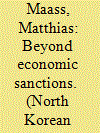

|
|
|
|
|
| Publication |
2011.
|
| Summary/Abstract |
In 2010, Taiwan's president, Ma Ying-jeou, explained the rationale for his country signing a major economic cooperation treaty with mainland China with the following statement: "We can handle diplomatic isolation, but economic isolation is fatal." This essay will make the argument that in the case of North Korea, the opposite is true: Economic isolation appears fairly manageable for Pyongyang, but diplomatic sanctions may in fact enhance a broad coercive strategy significantly.
This argument will be framed within the broader claim that in particular in the case of North Korea, sanctions have been conceptualized too narrowly-they have been viewed as economic coercion only. Instead, the argument is made that sanctioning states should consider the entire spectrum allowed under Chapter VII, Article 41 of the UN Charter.
The discussion in this article will be limited to the case of North Korea for reasons of space and the urgent need to address the deteriorating security situation on the Korean Peninsula, given the country's rise to quasi-nuclear power status. In light of this development, the sanctions regime currently in place needs to be reevaluated. A reorientation towards diplomatic sanctions will allow for a broader coercive strategy that is mindful of nuclear deterrence but goes beyond economic sanctions, which have not been successful in restricting Pyongyang's military-strategic objectives.
|
|
|
|
|
|
|
|
|
|
|
|
|
|
|
|
| 2 |
ID:
092066
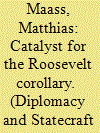

|
|
|
|
|
| Publication |
2009.
|
| Summary/Abstract |
The "Roosevelt Corollary to the Monroe Doctrine of 1904/05" constitutes a landmark in United States foreign policy. However, the 1902/03 Venezuela Crisis-in particular, the arbitration process between the South American country and Germany, Great Britain, and Italy that settled the crisis-led to President Theodore Roosevelt's decision to amend the Monroe Doctrine. The arbitrational award was an important impetus for the corollary because its decision appeared to encourage future European interventions in the western hemisphere. The Roosevelt Corollary was needed to prevent a situation similar to the 1902/03 Venezuela Crisis from occurring again. Strategically speaking, Roosevelt felt the corollary was necessary to uphold the Monroe Doctrine under new circumstances.
|
|
|
|
|
|
|
|
|
|
|
|
|
|
|
|
| 3 |
ID:
112517
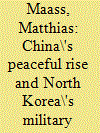

|
|
|
|
|
| Publication |
2011.
|
| Summary/Abstract |
It appears that the latest crisis on the Korean Peninsula, triggered on November 23, 2010, by North Korea, has led the Chinese leadership to revisit its relationship with the Democratic People's Republic of Korea (DPRK) with a renewed sense of urgency. In this paper, I argue that in light of China's wider regional ambitions in particular; such a reexamination is becoming more and more necessary. It has been correctly asserted that the most important source of conflict between China and the United States lies in Beijing's ambition to reclaim China 's historical place as a leading power in the world and the Washington's refusal to surrender the United States' position as the sole superpower: Here, I argue that the likelihood of this conflict erupting in the long term is increased by North Korea's recent aggressive and violent foreign policy bemuse this threatens to further anchor the United States in East Asia, primarily in the context of security affairs.
|
|
|
|
|
|
|
|
|
|
|
|
|
|
|
|
| 4 |
ID:
085900
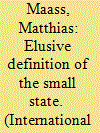

|
|
|
|
|
| Publication |
2009.
|
| Summary/Abstract |
The small state has so far escaped a consensus definition because 'the' small state has in fact been conceived of very differently. Different studies of 'the' small state have characterized it quite distinctly. In fact, there is substantial disagreement even over what type of criteria, quantifiable or qualitative, are most appropriate to characterize the small state. However, I argue that such fundamental disagreement over what makes a state small has actually benefited the area of small states studies by providing it with conceptual flexibility to match different research designs as well as the quite substantial variations among actual small states in the world. In short, in the discipline of international relations as well as in reality, more than one definition of the small state does and should exist.
|
|
|
|
|
|
|
|
|
|
|
|
|
|
|
|
| 5 |
ID:
116675
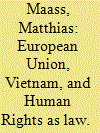

|
|
|
|
|
| Publication |
2012.
|
| Summary/Abstract |
The year 1995 marked a major watershed for modern Vietnam. It completed its post-Cold War strategy of "multilateralizing" its foreign policy by joining ASEAN, normalizing relations with the US, and signing a comprehensive framework agreement with the EU. All three are recognized as major accomplishments for modern Vietnamese diplomacy. However, in the EU-Vietnam framework agreement, Hanoi made an unprecedented concession when it agreed to the human rights clause in the treaty. For the very first time, Vietnam had accepted an explicit, legally binding stipulation on human rights in a bilateral treaty. This remarkable development resulted from the confluence of three major dynamics. First, Hanoi had committed itself to establish sound relations with all major economic centers-of-gravity at the time, ASEAN, the US, and the EU. Second, the EU also was keenly interested in stronger relations with Asian countries but was flexible about prioritizing any particular bilateral relationship. Third, Brussels' diplomats had to work off a treaty template when negotiating fundamental bilateral agreements. The standard EU framework agreement at the time included a human rights clause. In 1995, the EU was insisting that any treaty with Vietnam would have to include a clause on human rights. Initially, Hanoi rejected such a treaty provision, and the negotiations stalled. However, when Hanoi realized that Brussels felt no urgency to complete the treaty and was unable to compromise on human rights, Vietnam's leadership reconsidered. In order to complete the strategy of "multilateralizing" its international affairs, Vietnam had to accept the human rights clause in the treaty with the EU.
|
|
|
|
|
|
|
|
|
|
|
|
|
|
|
|
| 6 |
ID:
139504
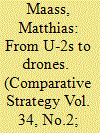

|
|
|
|
|
| Summary/Abstract |
Since September 11, 2001, the United States has been relying heavily on drone strikes for counterterrorism. This policy remains controversial. I argue that assertive statecraft is needed to prevent drone strikes from undermining U.S. foreign and security policy over the long term. The article argues legally, comparatively, and historically, using President's Eisenhower restrictions on U.S. aerial espionage programs during the earlier Cold War, as a benchmark for President Obama's policy on missions by armed drones. A more limited drone program offers a better balance between what is necessary for security and what is politically sustainable.
|
|
|
|
|
|
|
|
|
|
|
|
|
|
|
|
| 7 |
ID:
165782
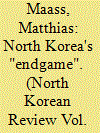

|
|
|
|
|
| Summary/Abstract |
Article Type: Commentary Essay Purpose—Much of the debate on North Korea assumes that Pyongyang would be truly satisfied with the overall status quo if it were only safe and secure enough. The purpose here is to argue that Pyongyang may instead be looking for reunification from a position of strength. Method—The short paper is built mostly on secondary-source research. It uses short historical case studies in addition to professional writings, both academic and journalistic. Findings—Overall, the argument is that Pyongyang has never abandoned the goal of unifying the peninsula under its own leadership. In fact, its "endgame" is a DPRK that spans the entire peninsula and unites the entire Korean people. Implications—To go forward and work with a nuclear North Korea towards a mutually agreeable long-term arrangement on the peninsula, understanding the long-term goals of Kim Jong Un is critical. The argument presented here may instill more caution in negotiation partners and statesmen/-women, especially in Seoul, Washington, and Tokyo, but also in Beijing and Moscow.
|
|
|
|
|
|
|
|
|
|
|
|
|
|
|
|
| 8 |
ID:
117669
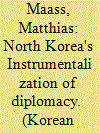

|
|
|
| 9 |
ID:
153879
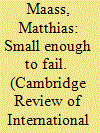

|
|
|
|
|
| Summary/Abstract |
Since the Peace of Westphalia, few great powers have “died”, while the “death rate” and proliferation of small states has been dramatic at times. What causes these fluctuations? In this paper, I claim that the dominant reason for the extinction, emergence and proliferation of the small state over the last three and a half centuries is to be found at the system level. Ultimately, small state survival is determined by the particular set-up of the state system. I advance this argument from the perspective of international relations theory, integrating the relevant scholarship of the English School and realism, especially structural realism. The latter’s systemic perspective provides the basis for arguing that small states are structurally irrelevant. It is this feature of the small state, its irrelevance with regard to the power-based structure of the state system, which has caused the small state to “struggle for existence” in the past, and which has allowed small states to proliferate during the bipolar Cold War.
|
|
|
|
|
|
|
|
|
|
|
|
|
|
|
|
| 10 |
ID:
131269
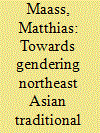

|
|
|
|
|
|
|
|